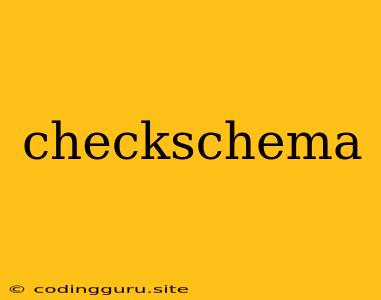Understanding checkschema: A Tool for Data Validation in Python
In the world of data science and software development, ensuring data quality and consistency is paramount. This is where schema validation comes into play, and checkschema emerges as a powerful tool for this task.
What is checkschema?
checkschema is a Python library specifically designed for validating data against predefined schemas. It offers a flexible and intuitive way to define the structure, types, and constraints of your data, providing a robust mechanism for catching errors and ensuring data integrity.
Why is Schema Validation Important?
Schema validation is essential for various reasons:
- Data Integrity: It ensures that data conforms to the expected format, preventing inconsistencies and errors that can lead to unexpected behavior in your applications.
- Error Detection: By validating data early in the process, you can catch potential issues before they cause significant problems down the line.
- Data Quality: Schema validation helps maintain data quality, making your data more reliable and trustworthy for analysis, reporting, and decision-making.
- Code Maintainability: By clearly defining data structures, schemas contribute to code readability and maintainability, making it easier to understand and work with your data.
How checkschema Works
checkschema utilizes a declarative approach to schema definition. You define the schema using a Python dictionary, specifying the expected types, formats, and constraints for each field.
Here's a simple example:
from checkschema import Schema
schema = Schema({
"name": {"type": str, "required": True},
"age": {"type": int, "min": 18},
"email": {"type": str, "format": "email"}
})
In this schema:
nameis a required field and must be a string.agemust be an integer and greater than or equal to 18.emailmust be a valid email address.
You can then use the schema to validate data:
data = {
"name": "John Doe",
"age": 25,
"email": "[email protected]"
}
result = schema.validate(data)
if result.is_valid:
print("Data is valid!")
else:
print("Data is invalid:")
print(result.errors)
checkschema will return a validation result object containing information about whether the data is valid and any errors encountered.
Key Features of checkschema
- Versatile Schema Definition:
checkschemaprovides a wide range of data types, formats, and constraints to define your schemas precisely. - Flexibility: It supports nested schemas, allowing you to define complex data structures.
- Custom Validation: You can define custom validation rules using Python functions for more complex validation logic.
- Error Handling:
checkschemaprovides detailed error messages to help you understand the validation failures. - Performance: It is designed to be efficient and performant, handling large datasets with ease.
When to Use checkschema
checkschema is a powerful tool that can be used in various scenarios:
- Data Input Validation: Validate user input in web applications, APIs, or command-line interfaces.
- Data Processing: Ensure data consistency during data cleaning, transformation, or analysis.
- API Integration: Validate data received from external APIs or services.
- Database Validation: Check data against database schemas before inserting or updating records.
Conclusion
checkschema is a valuable tool for data validation in Python, offering a streamlined and efficient approach to ensuring data quality and consistency. Its flexibility, customizable features, and comprehensive error handling make it a highly recommended choice for developers and data scientists who prioritize data integrity and reliability. By adopting schema validation with checkschema, you can significantly improve the quality and robustness of your data-driven applications and workflows.
